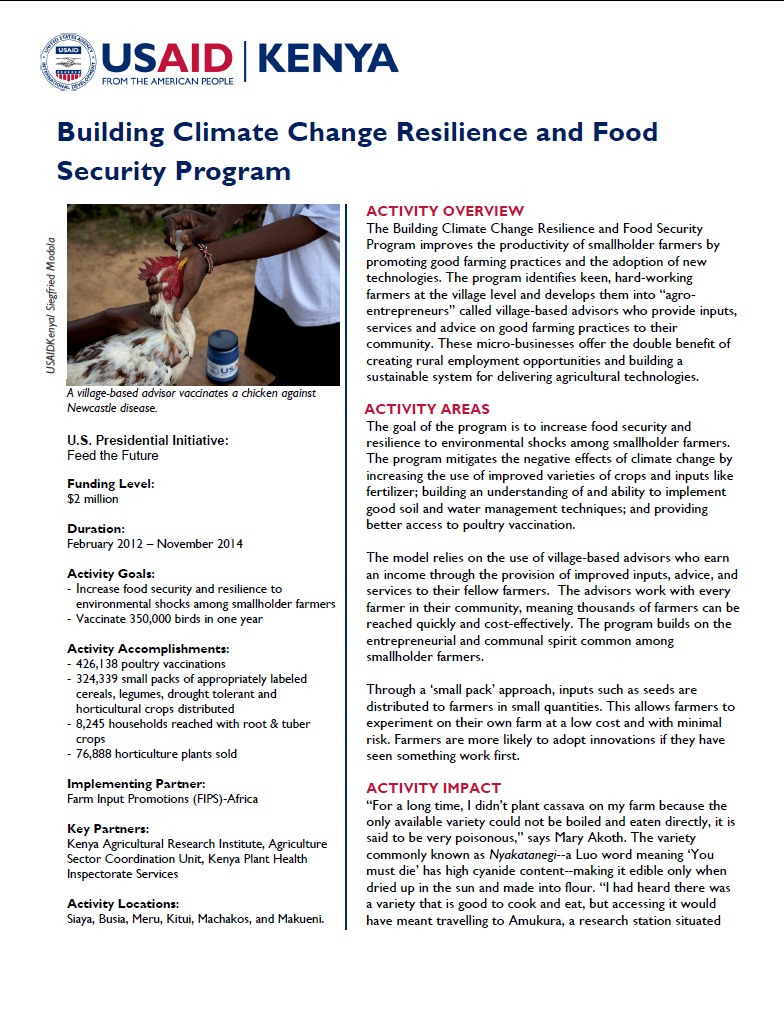U.S. Presidential Initiative:
Feed the Future
Funding Level:
$2 million
Duration:
February 2012 – November 2014
Activity Goals:
- Increase food security and resilience to environmental shocks among smallholder farmers
- Vaccinate 350,000 birds in one year
Activity Accomplishments:
- 426,138 poultry vaccinations
- 324,339 small packs of appropriately labeled cereals, legumes, drought tolerant and horticultural crops distributed
- 8,245 households reached with root & tuber crops
- 76,888 horticulture plants sold
Implementing Partner:
Farm Input Promotions (FIPS)-Africa
Key Partners:
Kenya Agricultural Research Institute, Agriculture Sector Coordination Unit, Kenya Plant Health Inspectorate Services
Activity Locations:
Siaya, Busia, Embu, Kitui, Machakos, and Makueni.
ACTIVITY OVERVIEW
The Building Climate Change Resilience and Food Security Program is improving the productivity of smallholder farmers by promoting good farming practices and adoption of new technologies. The program identifies keen, hard-working farmers at the village level and develops them into “Agro-Entrepreneurs” called Village-Based Advisors who provide inputs, services and advice on good farming practices to their community. These micro-businesses offer the double benefit of creating rural employment opportunities and building a sustainable system for delivering agricultural technologies.
ACTIVITY AREAS
The goal of the program is to increase food security and resilience to environmental shocks among smallholder farmers. The program mitigates the negative effects of climate change by increasing the use of improved varieties of crops and inputs like fertilizer; building an understanding of and ability to implement good soil and water management techniques; and providing better access to poultry vaccination.
The model relies on the use of “Village-Based Advisors” who earn an income through the provision of improved inputs, advice and services to their fellow farmers. The Advisors work with every farmer in their community, meaning thousands of farmers can be reached quickly and cost-effectively. The program builds on the entrepreneurial and communal spirit common among smallholder farmers.
Through a ‘small pack’ approach, inputs such as seeds are distributed to farmers in small quantities. This allows farmers to experiment on their own farm at a low cost and with minimal risk. Farmers are more likely to adopt innovations if they have seen something work first.
ACTIVITY IMPACT
“For a long time, I didn’t plant cassava on my farm because the only available variety could not be boiled and eaten directly, it is said to be very poisonous,” says Mary Akoth. The variety commonly known as Nyakatanegi--a Luo word meaning ‘You must die’ has high cyanide content--making it edible only when dried up in the sun and made into flour. “I had heard there was a variety that is good to cook and eat, but accessing it would have meant travelling to Amukura, a research station situated over 50 kilometers from here. I was not even sure whether I would be given the seed if I decided to travel there,” she says.
Mary’s situation changed when Farm Inputs Promotions Africa, with support from USAID, started operating in the area. The organization recruited a network of 15 hard-working farmers from within target villages to act as self-employed Village-Based Agricultural Advisors who multiply and disseminate improved cassava varieties and other farming technologies to thousands of farmers in rural parts of the district.
“I was elated when I received 20 cassava cuttings on my farm from the Village-Based Advisor,” said Akoth. “She distributed a few stems to many farmers in the village and advised us to use them to expand.” The organization introduced MH 95, MM 97 and Migyera varieties of improved cassava that are high-yielding and disease-tolerant. The varieties, sourced from Kenya Agriculture Research Institute, take about eight months to mature, a significant reduction from the 12 months that traditional varieties take to mature.
USAID Contact:
Samson Okumu, Activity Manager
USAID/Kenya
Agriculture, Business and Environment Office
Tel: +254 208 622 2245
Email: sokumu@usaid.gov
Building Climate Change Resilience and Food Security Program Contact:
Dr. Paul Seward, Managing Director
Farm Input Promotions-Africa
Tel: +254 (0) 724 700 007
Email: fipsafrica@yahoo.com
Updated August 2014








Comment
Make a general inquiry or suggest an improvement.